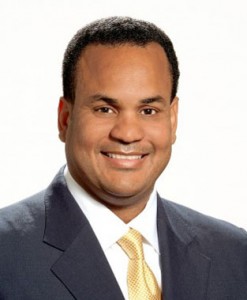
By Michael B. Halkitis
Madame President; I along with thousands of Bahamians were shocked, distressed and deeply saddened to hear of the unrest and, some say, riots and mayhem that occurred over the past weekend in the Bain Town community. The headlines of two of the major dailies blared:
“Riot in Bain Town and Bain Town Rage.”
The police to their credit were seen to be bringing the matter under control and tensions having eased, they were seen to be conducting a walkabout in the area in the days following those unfortunate events.
Interestingly we have heard not a word from the Minister or Ministry of National Security. Not a word. Mum’s the word!
These events represent just a glimpse of the explosion of the rage, the anger, the feeling of helplessness and hopelessness simmering barely beneath the surface in many of our communities.
Over the past weekend there were a reported three homicides in New Providence. Another one was reported yesterday. The homicide count now stands at a reported eighty six (86); surpassing last year’s total with over a month left in the year.
The heads of the Accident and Emergency Section at the Princess Margaret Hospital were in the press recently telling us that they are overwhelmed with the amount of trauma cases that they have to deal with; gunshot wounds, stabbings and choppings. They are finding it nearly impossible to cope.
The Princess Margaret Hospital is overwhelmed; there are reports of insufficient beds to accommodate the patients. The Princess Margaret Hospital and other public health facilities are struggling to accommodate the patient load as the stagnant economy pushes more and more people into public facilities as they can no longer afford to go to the private clinics.
There continue to be reports of shortages of basic supplies in the Princess Margaret Hospital and other public health facilities.
The police, pastors and professional counselors all tell us that the rates of suicide and suicide attempts in the Bahamas are at levels never seen before; the result of hopelessness, helplessness and social upheaval due in large part to the dismal economy.
The economy continues to stagnate and can not create the numbers of jobs needed to employ displaced and laid off workers and new entrants into the work force. Since 2007 at least 20,000 students have left high school alone; not counting college graduates and persons who have returned from abroad.
These are but a few of the pressing the issues that should be exercising our minds and consuming our time. These are the issues that concern the Bahamian public the most. These are the issues that the people of the Bahamas want their leaders, their parliament to address. Instead of addressing these issues, what we have here in this Honourable Senate is another bash Christie session. It seems that the playbook of this FNM administration is “when all else fails, bash Christie”. When their failures and shortcomings have been exposed; blame it on the PLP.
Madame President, there is an old saying that goes:
“You can’t have your cake and eat it too”.
If you want to have your cake you can not eat it, and if you eat your cake, you can no longer have it. The gist of the saying is that you can not, at the same time, hold two positions, two opinions that are contrary to each other. In other words, you can not have it both ways. You have to make a decision and live with the consequences.
It is very apparent that in relation to the debate on this resolution, what the government is seeking to do is to have their cake and eat it too.
On the one hand they seek to vilify the Progressive Liberal Party and in particular Perry Christie for “giving away the land” (in their words); and on the other hand they sing the high praises of the project.
Which one is? Is it a giveaway or is it a transformative project? Is it bad or is it good? This administration should make up its mid quickly so that we can move on.
The facts are very simple; the BahaMar project was part of a larger and very ambitious vision of the Progressive Liberal Party to transform the island of New Providence by:
• moving the port to the southwest of New Providence,
• a complete redevelopment of downtown Nassau to include commercial and residential development and green spaces,
• a new ultra modern Straw Market,
• the Albany project in the Southwest,
• the redevelopment and modernization of the Lynden Pindling International Airport.
The aim of this ambitious and wide ranging vision was to inject life into a faltering tourism product by making Nassau an exciting destination again.
At all stages, professional advice was sought from both inside and outside the public service and decisions were made based on what the Progressive Liberal Party thought at the time was in the best interest of the majority of the Bahamian people. The leader of the Progressive Liberal Party has said on numerous occasions inside and outside Parliament that he takes full responsibility for and stands by the decisions he and his cabinet made.
All of these projects were in various stages of development or implementation when the Progressive Liberal Party lost the elections and demitted office in May 2007.
Now the FNM came to office in 2007 and by 2008 had agreed a supplementary Heads of Agreement with the developers of BahaMar.
The FNM took out what they wanted to take out of the deal negotiated with BahaMar by the Progressive Liberal Party and they left in what they wanted to leave in. So whatever is in the deal between the Government of the Bahamas and the BahaMar developers is there because this administration wanted to keep it there; full stop.
They took out what they wanted to take out and they left in what they wanted to leave in. In fact, if they wanted to, if they felt it was such a bad deal, they could have cancelled the agreement altogether.
In the PLP agreement there was no limit on Bahamian participation. No $200 million limit, no limit at all. In the PLP agreement there was no 8,150 work permits. There was no Chinese involvement at all. There was a commitment to maximize Bahamian participation at all levels. No limits.
I along with many Bahamians eagerly await the laying of the so called secret deals on the table. The PLP was accused of entering into secret deals with BahaMar. Now that the present administration has all the files, please lay the secret agreements so that all Bahamians may see them. While you are at it, please reveal the names of the “PLP insiders” who were supposedly buying BTC.
I listen to the speakers and on the one hand they lament what they call the great land giveaway; and right away praise the project and in fact brazenly seek to take ownership of it.
On the issue of the sale of the Radisson hotel; the sale of loss making properties is not something that originated with the immediate past administration. We know the story of what are now Breezes and Sandals and the other properties of the Hotel Corporation. They were sold under former FNM administrations. The rationale being that the new owners would inject money into the projects and revitalize them. The same is true for Radisson.
The model used to attract investment to this country has been used by successive administrations for over fifty years. Investors are encouraged to come to the Bahamas and as an inducement, various concessions are offered. Of late the issue of how much, if any concessions should be offered to potential investors has been hotly debated. The bottom line is that in an ever shrinking world the competition for capital is intense. So we either play that game or change the game. I will come back to this.
The BahaMar project appears to be going forward, in the other place, a resolution was passed unanimously in support of the project.
I believe that we now need to turn our attention to doing the things that are necessary to ensure that the project succeeds, that the maximum benefits are derived for Bahamians in terms of employment, business opportunities and other spinoff activity and that as a going concern the projects succeeds.
It is also time to begin to listen to the ever growing number of voices in the country that say we need to develop an alternative model; one that involves more ownership and control of our main industry and more involvement of Bahamians at the very highest levels. Notwithstanding the fact that the many small operators, in transportation, small resorts etc, are owners, the feeling is that Bahamians need to own some big properties.
What are some of the things that threaten this development and our tourism industry and therefore our economy at large?
Violent Crime
Not only does violent crime take a tremendous human toll in terms of loss of life, injury, impacts on the family and the spread of fear among other effects, uncontrolled violent crime has an economic impact.
The World Bank published a report in March 2007 titled “Crime, Violence, and Development: Trends, Costs and Policy Options in the Caribbean”
The report directly links the rate of economic growth in the region to the level of violent crime. In fact it places a figure on the amount of additional growth possible for some countries if the rate of homicide were reduced.
Among the findings:
• “Crime and violence are a development issue. The high rates of crime and violence in the region have both direct effects on human welfare in the short run and longer run effects on economic growth and social development.”
• “There is an over-reliance on the criminal justice approach to crime reduction to the detriment of other complementary approaches which can be effective in reducing certain types of crime and violence. Crime prevention through environmental design (CPTED), the study and design of environments to encourage desirable behavior and discourage antisocial behavior has significant potential to generate rapid decreases in property crime and some forms of interpersonal violence. These programs, by combining modern methods of policing with prevention interventions undertaken by both government and non-governmental organizations are extremely promising.”
• “To address the issue of youth violence, policy makers in the short run should borrow from the toolkit of evidence-based programs from other regions, such as early childhood development and mentoring programs, interventions to increase retention of high risk youth in secondary schools and opening schools after-hours and on week-ends to offer youth attractive activities to occupy their free time. While there are a multitude of programs in the region that address youth violence, few if any have been subject to rigorous impact evaluation. In the medium and long run, impact evaluations should systematically document what works in youth violence prevention in the Caribbean.”
The Caribbean has some of the highest rates of violent crime in the world and the Bahamas has some of the highest rates of violent crime in the Caribbean.
Here we have a detailed study telling us what we should already know. Crime directly has a negative effect on the economy and the high rates of crime, particularly violent crime in the Bahamas pose a very serious threat to the future economic well being of Bahamians.
Surely we can not expect visitors to flock to our shores when violent crime continues unabated and the response from the policy makers seems to be one of surrender.
In order for Bahamians to feel safe in their communities and workplaces and for our economy to recover and thrive violent crime must be attacked aggressively using many tools.
I agree with all who say that crime is a national problem; but the government must exercise leadership in this issue. That leadership should not be restricted to giving the police the resources they need to fight crime. Equal attention should be paid to prevention, rehabilitation and reintegration into the society.
Crime is not just a human and public issue but also an economic issue that threatens to plunge this nation into a vicious cycle of declining economic activity and rising violent crime.
I call on the government to put all the options on the table and roll out a comprehensive crime fighting strategy.
It would be a powerful indication of the level of this administration’s commitment to fighting crime if instead of borrowing $58 million to build a road; it used that $58 million to fight crime and ensure that Bahamians are no longer paralyzed with the fear of crime. Fear that has made Bahamians feel unsafe even in their own homes.
The way forward and ensuring Bahamian ownership
As I said earlier, increasingly we hear calls from members of the public, for an alternative model of development that:
• Lessens our reliance on foreign investors, because Bahamians have become increasing skeptical of the concessions granted to investors and the view that our nation is seemingly held hostage waiting for foreign investors to come along and develop our country for us
• Involves more Bahamian ownership of the larger and visibly successful touristic developments.
The Central Bank of the Bahamas in its Monthly Economic and Financial Developments report for September 2010 indicates that there is in excess of $5.6 billion on deposit in financial institutions.
Is it possible for us to make the determination, as a nation, to direct some of those funds to economically viable projects in the tourism industry?
I believe that by inviting small Bahamian investors to pool their funds and have these funds directed by professional managers operating under prescribed guidelines and accountable to shareholders, to viable projects; we can increase local ownership of the tourism industry, engender more pride in our industry and our country and thereby improve our tourism product.
So instead of abolishing the Hotel Corporation perhaps we can use this as a vehicle where, with the proper corporate governance and skilled management in place, opportunities may be identified for development. This body would then invite investors to participate, undertake negotiations with the government for concessions, and put the necessary teams in place to construct and manage the properties with the profits going to the shareholders, the Bahamian public.
The argument against is that the government should not be in business and that the experience thus far has not been good.
We must have the national resolve if we want to see more ownership that we will not allow the system to be abused. Alternatively perhaps the answer is to privatize the Hotel Corporation.
So for example the corporation may identify the potential for a small resort on Cat Island, the studies would be done, the business plan drawn up, negotiations undertaken with the government for concessions, investments invited from small and large investors, if necessary additional capital may be raised from the banks, the proper construction teams and upon completion the proper management teams are put in place to successfully run the operation.
The corporation would not be accountable to government but directly to the shareholders.
In essence we look internally for development funding instead of waiting for the foreign investor to come to save us.
Small investors would essentially participate in an IPO we can broaden ownership of the industry and ensure that tourism is everyone’s business. I believe that this is an avenue worth pursuing.
We must now begin to identify the opportunities that will be available for Bahamians in the BahaMar project. By identifying potential entrepreneurs may begin preparing themselves now by saving money toward starting their business and getting the necessary training and doing the necessary business plans. If we identify these now and begin to plan now, Bahamian entrepreneurs would get a head start and not be caught flatfooted trying to scramble to get ready when the project is completed. We have the institutions in place in the form of BAIC and the BDB that can take on this mission.
This project as well as the airport provides opportunities for a new class of entrepreneurs to take off. We must do what is necessary now to ensure that the same old players do not continue to get the best opportunities and everyone else is left to scramble over the leavings. Let us equip our people now to be able to acquire the skills, knowledge and information necessary to compete with the established business class.
In conclusion, I always prefer to look forward.
The citizens of this nation are looking to us not to be constantly sniping at each other, but to come together to arrive at solutions to this nation’s problems and to create opportunities for our people. If we fail in our responsibilities more and more people will simply opt out of the system because they feel it no longer serves them. They will no longer participate in the political process and they will seek their own form of justice.
When that happens we have all failed.
I support the resolution and look forward to the successful implementation of the project.







